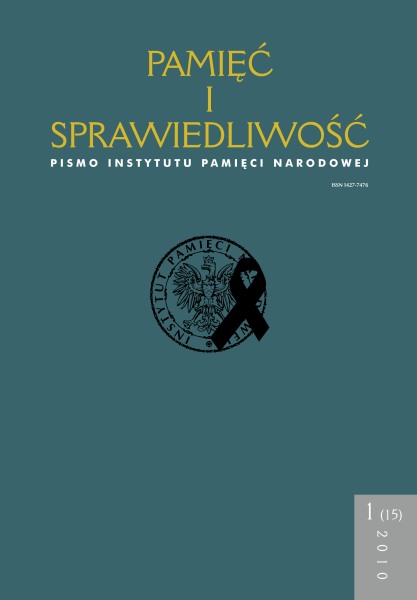Repatriacja czy deportacja? Radziecka akcja repatriacyjna na Słowacji w latach 1945–1948
Pamięć i Sprawiedliwość, Vol. 15 No 1 (2010), pages: 253-261
Publication date: 2010-06-30
Résumé
The main purpose of a Soviet repatriation action carried out after World War II was to forcibly return to the USSR all Soviet citizens who during the war, for many reasons such as: captivity, forced labor in Germany, emigration or escape, lived their country and settled down in Western and Central Europe. This action did
not omit Czechoslovakia. It is possible to highlight particular stages of the process of searching for, arresting and deporting people of Russian and Ukrainian origin and of other nationalities of the Soviet Union living in Czechoslovakia. Initially, those people who were under a relocation duty were appealed by Soviet secret service to appear in special camps or they were brought along by force. At the beginning of 1946, the second stage of repatriation action started. It was carried out by Soviet and Czechoslovak secret services acting in close collaboration. In assistance of Czechoslovak army, they were searching for displaced persons from the Soviet Union in the CSR and forced them to live the Republic. The fact of the matter is that the character of those actions was often rather brutal. Repatriation affected all Soviet citizens regardless their health condition like senility, pregnancy, marital status (some of them were already married to Czechoslovak partners), etc. The most violent acts characterized Czechoslovak forces. The last stage of repatriation action is dated from the beginning of 1947 until the end of 1948. Soviet forces
provided Czechoslovak authorities with the list of people who were to be deported from the CSR, as a consequence they were captured and arrested by Czechoslovak secret service. Furthermore, cases of similar actions occurred even in the early
1950s. It is unlikely to estimate the exact number of Soviet citizens (immigrants and refugees) who, after Red Army’s occupation of Slovakia, were not only deported to the Soviet Union but also repatriated in subsequent years.
 Język Polski
Język Polski
 English
English
 Deutsch
Deutsch
 Français (France)
Français (France)
 Italiano
Italiano
 Русский
Русский


 PDF (Język Polski)
PDF (Język Polski)
